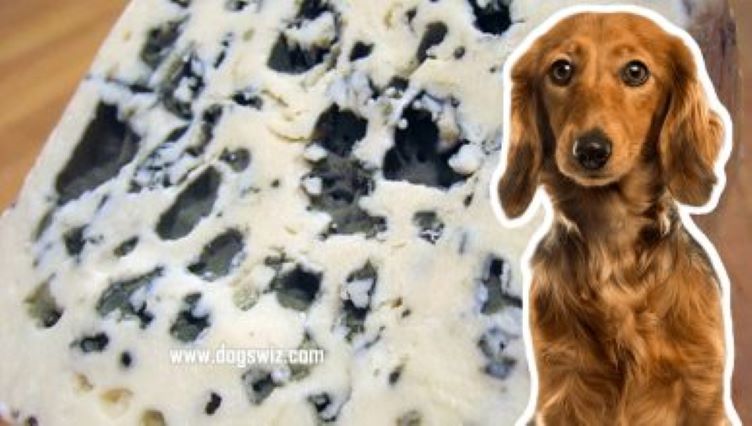It’s the training day. You’re all excited to start training your puppy, but your pup doesn’t appear to share your excitement. You realize that you need the treat to lure the dog to training. You remember a blue cheese packet that you love. You’re about to begin training when the thought occurs to you, “Is blue cheese safe for my dog?”
This article will provide you with the answer to your question!
“Can dogs eat blue cheese?” The short answer to this is No. While blue cheese (stilton) is not toxic to your dog, it is also not safe. Blue cheese contains some calcium, protein, and vitamin but when the bacteria cultures in blue cheese develop, they create a chemical called Roquefortine C, which is very harmful or even toxic to dogs. To understand the consequences of blue cheese on your pets, we must first know what blue cheese is and what it is made of.
What Is Blue Cheese?
Blue cheese is a type of cheese made with cow, sheep, or goat milk that has blue, green, or grey mold veins running through it. Blue cheeses have a distinctive sharp, salty flavor and can be soft and creamy or crumbly in texture. It is relatively low in fat but has a high sodium content. The bacteria cultures (Penicillium Roqueforti) are added to the cheese through injection. It’s this bacteria that can affect your pup’s health badly.
Can Dogs Eat Blue Cheese?
It is best to avoid giving blue cheese to dogs. However, giving blue cheese in a small amount once a while is okay as long as they aren’t lactose intolerant or allergic to dairy. Lactose intolerance is a condition where a body isn’t able to digest the lactose content found in milk and milk products. In the case of dogs, when puppies are fed their mother’s milk, they develop sufficient lactase enzymes in their bodies. When they reach adulthood and are no longer receiving their mother’s milk, their enzyme level rapidly drops, making it harder for their systems to accept dairy products. Lactose intolerance can cause diarrhea, bloating, vomiting. So, dogs with lactose intolerance shouldn’t eat any type of cheese or milk product.
Blue cheese is an absolute danger and toxic to dogs when it is ripe. When the blue cheese is ripening, the bacteria cultures produce a compound called Roquefortine C, which dogs can be sensitive to. Diarrhea, vomiting, convulsions, and high temperatures are just a few of the health problems that the chemical can bring in dogs. In addition to the danger of Roquefortine C poisoning, Blue cheese is high in cholesterol, with roughly 5 grams of saturated fat per serving. Blue cheese is also high in calories. A single ounce of blue cheese is believed to contain 99 calories. So, by allowing these cheeses to your dogs, you will be increasing the risk of obesity, pancreatitis, and other health hazards.
While blue cheese is safe under some circumstances and with proper handling, your pooch better stays away from it.
Symptoms of Roquefortine C Poisoning in Dogs
You might notice these symptoms if your dog has eaten spoiled or ripe blue cheese:
What To Do If Your Dog Eats Blue Cheese?
If your dog ate a little amount of blue cheese, they will be fine and you won’t have to worry about them. However, a few dogs may get a brief temporary incident of vomiting or diarrhea. You must contact your vet if there are any symptoms even with a modest amount of blue cheese. On the other hand, if you believe or know your dog has eaten spoiled blue cheese, contact your veterinarian right once. This is a medical emergency that could result in death. Your dog requires immediate medical attention.
Apart from blue cheese, you can avoid giving these to your dog:
Cheese with garlic, herb, and flavoring:
Some cheeses like cream cheese have additives like onions and garlic that can be toxic to dogs.
Goat cheese, Feta Cheese:
If your dog eats them, they’ll probably get pancreatitis, obesity, and other life-threatening illnesses.
Conclusion
Blue cheese can be toxic to your dog because it has Requefortine C, and affect your pup’s health badly. So it is probably best to avoid feeding your dog this cheese.
Make sure that you know the ingredients before you serve any other type of cheese to your dog.
Thank you for reading the article.
Here are some other cheese-related dog articles that you might be interested in.
Has your dog ever eaten blue cheese? What was their reaction like? If you have any experience with dogs eating cheese, please share it in the comments section below.
